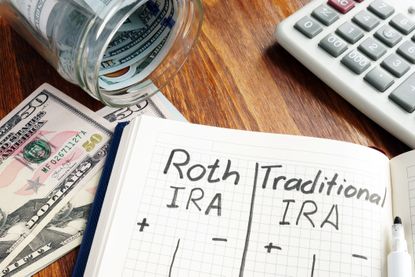Converting a Traditional IRA to a Roth in Retirement
You can convert money to a Roth no matter how old you are. But if the conversion boosts your income, it could have taxing consequences.
- (opens in new tab)
- (opens in new tab)
- (opens in new tab)
- Newsletter sign up Newsletter


I read your article about contributing to an IRA after age 70½. I know I can’t contribute to a traditional IRA at that age, but can I still roll over money from a traditional IRA to a Roth? Do I need to have earned income?
There's no age limit or income requirement to be able to convert a traditional IRA to a Roth. You must pay taxes on the amount converted, although part of the conversion will be tax-free if you have made nondeductible contributions to your traditional IRA. Once the money is in the Roth, you'll be able to take tax-free withdrawals (you may have to pay taxes on any earnings withdrawn within five years of the conversion, but only after you've withdrawn contributions and converted amounts). See Tax Rules for Roth Withdrawals for more information.
Be careful before making a big conversion in one year, however, because it can have a ripple effect on other areas of your finances. The conversion will be included in your adjusted gross income, which could bump some of your income into a higher tax bracket and could also cause you to pay more for your Medicare premiums and higher taxes on your Social Security benefits.

Sign up for Kiplinger’s Free E-Newsletters
Profit and prosper with the best of expert advice on investing, taxes, retirement, personal finance and more - straight to your e-mail.
Profit and prosper with the best of expert advice - straight to your e-mail.
If your adjusted gross income (plus tax-exempt interest income) is more than $85,000 if you're single or $170,000 if married filing jointly, you will have to pay the Medicare high-income surcharge. In 2016, people subject to the surcharge pay $170.50 to $389.80 per person each month, depending on their income, for Medicare Part B premiums. They also pay a high-income surcharge of $12.70 to $72.90 above their Part D premiums. See Medicare Part B Premiums in 2016 for more information.
The extra income from the conversion could also increase the portion of your Social Security benefits that is subject to income taxes. See Do You Have to Pay Taxes on Social Security Benefits? for details.
Also keep in mind that rolling money over from a traditional IRA to a Roth after 70½ won't reduce your RMD for the year of the conversion; the required withdrawal is based on your IRA balance as of the end of the previous year. But it can reduce your RMDs for future years. Instead of making one big conversion, consider rolling over a portion of the money from a traditional IRA to a Roth every year, with a close eye on the top of your tax bracket and income limits for the Medicare high-income surcharge and Social Security taxes.

As the "Ask Kim" columnist for Kiplinger's Personal Finance, Lankford receives hundreds of personal finance questions from readers every month. She is the author of Rescue Your Financial Life (McGraw-Hill, 2003), The Insurance Maze: How You Can Save Money on Insurance -- and Still Get the Coverage You Need (Kaplan, 2006), Kiplinger's Ask Kim for Money Smart Solutions (Kaplan, 2007) and The Kiplinger/BBB Personal Finance Guide for Military Families. She is frequently featured as a financial expert on television and radio, including NBC's Today Show, CNN, CNBC and National Public Radio.
-
-
 Travel demand and delays to soar, so plan ahead: Kiplinger Economic Forecasts
Travel demand and delays to soar, so plan ahead: Kiplinger Economic ForecastsEconomic Forecasts Travel demand and delays to soar, so plan ahead: Kiplinger Economic Forecasts
By Sean Lengell • Published
-
 To Afford Retirement, Take Inspiration from ‘The Golden Girls’
To Afford Retirement, Take Inspiration from ‘The Golden Girls’Roommates, a part-time job and renting out your vacation home could be ways to save early in retirement to cover more expensive years later on.
By Erin Wood, CFP®, CRPC®, FBSⓇ • Published
-
 Getting Out of an RMD Penalty
Getting Out of an RMD Penaltyretirement When your brokerage firm miscalculates your required minimum distributions, you have recourse.
By Kimberly Lankford • Published
-
 Borrowers Get More Time to Repay 401(k) Loans
Borrowers Get More Time to Repay 401(k) Loansretirement If you leave your job while you have an outstanding 401(k) loan, Uncle Sam now gives you extra time to repay it -- thanks to the new tax law.
By Kimberly Lankford • Published
-
 It’s Not Too Late to Boost Retirement Savings for 2018
It’s Not Too Late to Boost Retirement Savings for 2018retirement Some retirement accounts will accept contributions for 2018 up until the April tax deadline.
By Kimberly Lankford • Published
-
 How Your HSA Can Reimburse You for Medicare Premiums Paid
How Your HSA Can Reimburse You for Medicare Premiums PaidMedicare Even if your Medicare premiums are automatically deducted from your Social Security check, you can take tax-free withdrawals from a health savings account to reimburse yourself for them.
By Kimberly Lankford • Last updated
-
 How to Correct a Mistake on Your RMDs from IRAs
How to Correct a Mistake on Your RMDs from IRAsretirement If you didn't take out the correct required minimum distribution because your brokerage firm made a mistake, the IRS may show some leniency.
By Kimberly Lankford • Published
-
 Making the Most of a Health Savings Account Once You Turn Age 65
Making the Most of a Health Savings Account Once You Turn Age 65Making Your Money Last You’ll face a stiff penalty and taxes if you tap your health savings account for non-medical expenses before the age of 65. After that, the rules change.
By Kimberly Lankford • Published
-
 Reporting Charitable IRA Distributions on Tax Returns Can Be Confusing
Reporting Charitable IRA Distributions on Tax Returns Can Be ConfusingIRAs Taxpayers need to be careful when reporting charitable gifts from their IRA on their tax returns, or they may end up overpaying Uncle Sam.
By Kimberly Lankford • Published
-
 Make the Most of the New Military Retirement Plan
Make the Most of the New Military Retirement Planretirement The government is offering a new retirement option so that service members who leave the military before qualifying for a pension can still receive some benefits.
By Kimberly Lankford • Published




